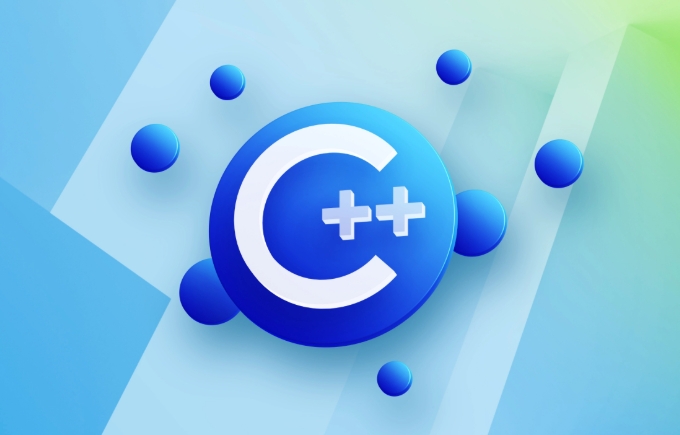Lambda expressions are a convenient way to write inline functions in C, especially for passing small logic as parameters to other functions, such as functions in STL algorithms. Its basic syntax includes capture list (in square brackets), parameter list (optional) and function body (in curly brackets), such as: [capture](parameters) -> return_type { // function body}. 1. The capture list specifies the external variables that the lambda can access and its access method, such as [x] captured by value, [&x] captured by reference; 2. The return type can be omitted, and if the function body contains only one return statement, it will be derived by the compiler; 3. Use the mutable keyword to modify the variables captured by value; 4. Common uses include combined with STL algorithms, such as predicates or operations in std::remove_if or std::sort; 5. Lambda is suitable for short, one-time logic, and complex or multiplexed logic should use ordinary functions or functors. It is recommended to keep lambda concise, avoid excessive capture of variables, and use reference capture with caution to prevent dangling references.

Lambda expressions in Ca are a convenient way to write inline functions — especially useful when passing small bits of logic as arguments to other functions, like those in the STL algorithms. If you've seen code with square brackets and => , and wondered what's going on, this tutorial should clear things up.

Basic Syntax of a Lambda
A lambda expression starts with a capture clause (in square brackets), followed by parameter list (optional), then the body inside curly braces.

Here's the general structure:
[capture](parameters) -> return_type {
// function body
}You don't always have to specify the return type — the compiler can deduce it if the body has a simple return statement.

For example:
auto multiply = [](int a, int b) {
return a * b;
}; This creates a lambda that multiples two integers and stores it in a variable called multiply . You can call it like a regular function: multiply(3, 4) returns 12.
Capturing Variables from the Surrounding Scope
The capture clause tells the lambda which variables from the outer scope it can access, and how (by value or reference).
-
[x]capturesxby value (copy) -
[&x]capturesxby reference -
[&]captures everything used by reference -
[=]captures everything used by value
Example:
int offset = 5;
auto addOffset = [offset](int value) {
return value offset;
}; In this case, offset is copied into the lambda. Modifying offset later won't affect the value inside the lambda.
If you want to change captured values by value, you need to mark the lambda mutable:
int count = 0;
auto increment = [count]() mutable {
return count;
}; Now each call to increment() increases its own copy of count .
Using Lambdas with STL Algorithms
One of the most common uses for lambdas is as predictates or operations in STL algorithms.
Say you have a vector of numbers and you want to remove all even numbers:
std::vector<int> numbers = {1, 2, 3, 4, 5, 6};
numbers.erase(
std::remove_if(numbers.begin(), numbers.end(), [](int n) {
return n % 2 == 0;
}),
numbers.end()
);Here, the lambda checks if a number is even and returns true for those to be removed. It's short, self-contained, and avoids having to define a separate function.
Another common use is sorting with custom logic:
std::vector<std::string> names = {"Zoe", "Alice", "Bob"};
std::sort(names.begin(), names.end(), [](const std::string& a, const std::string& b) {
return a.length() < b.length();
});This sorts the strings based on their length instead of alphabetical order.
When to Use Lambdas vs Regular Functions
Lambdas are best for small, one-off pieces of logic that don't need reuse. They make your code more readable when the logic is tightly coupled with another operation.
On the other hand, if the logic is complex or reused across multiple places, stick with a normal function or function.
Some tips:
- Keep lambdas short and focused
- Avoid capturing too many variables unless necessary
- Use
mutableonly when you really need to modify copies - Prefer capturing by reference only when needed — otherwise prefer by value to avoid dangling references
That's the core of working with lambdas in C . They're powerful but easy to overdo — use them where they simplify code without making it harder to follow.
The above is the detailed content of C tutorial on lambda expressions. For more information, please follow other related articles on the PHP Chinese website!

Hot AI Tools

Undress AI Tool
Undress images for free

Undresser.AI Undress
AI-powered app for creating realistic nude photos

AI Clothes Remover
Online AI tool for removing clothes from photos.

Clothoff.io
AI clothes remover

Video Face Swap
Swap faces in any video effortlessly with our completely free AI face swap tool!

Hot Article

Hot Tools

Notepad++7.3.1
Easy-to-use and free code editor

SublimeText3 Chinese version
Chinese version, very easy to use

Zend Studio 13.0.1
Powerful PHP integrated development environment

Dreamweaver CS6
Visual web development tools

SublimeText3 Mac version
God-level code editing software (SublimeText3)

Hot Topics
 C Polymorphism : is function overloading a kind of polymorphism?
Jun 20, 2025 am 12:05 AM
C Polymorphism : is function overloading a kind of polymorphism?
Jun 20, 2025 am 12:05 AM
Yes, function overloading is a polymorphic form in C, specifically compile-time polymorphism. 1. Function overload allows multiple functions with the same name but different parameter lists. 2. The compiler decides which function to call at compile time based on the provided parameters. 3. Unlike runtime polymorphism, function overloading has no extra overhead at runtime, and is simple to implement but less flexible.
 What Are the Different Kinds of Polymorphism in C ? Explained
Jun 20, 2025 am 12:08 AM
What Are the Different Kinds of Polymorphism in C ? Explained
Jun 20, 2025 am 12:08 AM
C has two main polymorphic types: compile-time polymorphism and run-time polymorphism. 1. Compilation-time polymorphism is implemented through function overloading and templates, providing high efficiency but may lead to code bloating. 2. Runtime polymorphism is implemented through virtual functions and inheritance, providing flexibility but performance overhead.
 C : Is Polymorphism really useful?
Jun 20, 2025 am 12:01 AM
C : Is Polymorphism really useful?
Jun 20, 2025 am 12:01 AM
Yes, polymorphisms in C are very useful. 1) It provides flexibility to allow easy addition of new types; 2) promotes code reuse and reduces duplication; 3) simplifies maintenance, making the code easier to expand and adapt to changes. Despite performance and memory management challenges, its advantages are particularly significant in complex systems.
 C Destructors: Common Errors
Jun 20, 2025 am 12:12 AM
C Destructors: Common Errors
Jun 20, 2025 am 12:12 AM
C destructorscanleadtoseveralcommonerrors.Toavoidthem:1)Preventdoubledeletionbysettingpointerstonullptrorusingsmartpointers.2)Handleexceptionsindestructorsbycatchingandloggingthem.3)Usevirtualdestructorsinbaseclassesforproperpolymorphicdestruction.4
 Polymorphism in C : A Comprehensive Guide with Examples
Jun 21, 2025 am 12:11 AM
Polymorphism in C : A Comprehensive Guide with Examples
Jun 21, 2025 am 12:11 AM
Polymorphisms in C are divided into runtime polymorphisms and compile-time polymorphisms. 1. Runtime polymorphism is implemented through virtual functions, allowing the correct method to be called dynamically at runtime. 2. Compilation-time polymorphism is implemented through function overloading and templates, providing higher performance and flexibility.
 C tutorial for people who know Python
Jul 01, 2025 am 01:11 AM
C tutorial for people who know Python
Jul 01, 2025 am 01:11 AM
People who study Python transfer to C The most direct confusion is: Why can't you write like Python? Because C, although the syntax is more complex, provides underlying control capabilities and performance advantages. 1. In terms of syntax structure, C uses curly braces {} instead of indentation to organize code blocks, and variable types must be explicitly declared; 2. In terms of type system and memory management, C does not have an automatic garbage collection mechanism, and needs to manually manage memory and pay attention to releasing resources. RAII technology can assist resource management; 3. In functions and class definitions, C needs to explicitly access modifiers, constructors and destructors, and supports advanced functions such as operator overloading; 4. In terms of standard libraries, STL provides powerful containers and algorithms, but needs to adapt to generic programming ideas; 5
 What Are the Various Forms of Polymorphism in C ?
Jun 20, 2025 am 12:21 AM
What Are the Various Forms of Polymorphism in C ?
Jun 20, 2025 am 12:21 AM
C polymorphismincludescompile-time,runtime,andtemplatepolymorphism.1)Compile-timepolymorphismusesfunctionandoperatoroverloadingforefficiency.2)Runtimepolymorphismemploysvirtualfunctionsforflexibility.3)Templatepolymorphismenablesgenericprogrammingfo
 C Polymorphism: Coding Style
Jun 19, 2025 am 12:25 AM
C Polymorphism: Coding Style
Jun 19, 2025 am 12:25 AM
C polymorphismisuniqueduetoitscombinationofcompile-timeandruntimepolymorphism,allowingforbothefficiencyandflexibility.Toharnessitspowerstylishly:1)Usesmartpointerslikestd::unique_ptrformemorymanagement,2)Ensurebaseclasseshavevirtualdestructors,3)Emp






